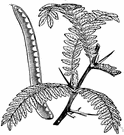carob
(redirected from carobs)Also found in: Thesaurus, Medical, Encyclopedia.
Related to carobs: carob tree, Carbs
car·ob
(kăr′əb)n.
1.
a. A Mediterranean evergreen tree (Ceratonia siliqua) of the pea family, having pinnately compound leaves and large, dark, leathery pods.
b. The pod of this plant, containing a sweet edible pulp and seeds that yield a gum used as a stabilizer in food products. Also called algaroba.
2. An edible powder or flour made from the ground seeds and pods of this plant, used as a substitute for chocolate.
[Middle English carabe, from Old French carobe, from Medieval Latin carrūbium, from Arabic ḫarrūba, carob pod; see algaroba.]
American Heritage® Dictionary of the English Language, Fifth Edition. Copyright © 2016 by Houghton Mifflin Harcourt Publishing Company. Published by Houghton Mifflin Harcourt Publishing Company. All rights reserved.
carob
(ˈkærəb)n
1. (Plants) Also called: algarroba an evergreen leguminous Mediterranean tree, Ceratonia siliqua, with compound leaves and edible pods
2. (Cookery) Also called: algarroba or Saint John's bread the long blackish sugary pod of this tree, used as a substitute for chocolate and for animal fodder
[C16: from Old French carobe, from Medieval Latin carrūbium, from Arabic al kharrūbah]
Collins English Dictionary – Complete and Unabridged, 12th Edition 2014 © HarperCollins Publishers 1991, 1994, 1998, 2000, 2003, 2006, 2007, 2009, 2011, 2014
car•ob
(ˈkær əb)n.
1. a Mediterranean tree, Ceratonia siliqua, of the legume family, bearing long leathery pods containing sweet edible pulp.
2. the pod of this tree.
3. the pulp of the pods, often ground into a powder and used esp. as a substitute for chocolate.
[1540–50; < Middle French carobe < Medieval Latin carrūbium < Arabic kharrūb bean-pods, carobs]
Random House Kernerman Webster's College Dictionary, © 2010 K Dictionaries Ltd. Copyright 2005, 1997, 1991 by Random House, Inc. All rights reserved.
ThesaurusAntonymsRelated WordsSynonymsLegend:
Switch to new thesaurus
| Noun | 1. |  carob - long pod containing small beans and sweetish edible pulp; used as animal feed and source of a chocolate substitute carob - long pod containing small beans and sweetish edible pulp; used as animal feed and source of a chocolate substitutecarob powder, Saint-John's-bread, carob - powder from the ground seeds and pods of the carob tree; used as a chocolate substitute carob bean tree, carob tree, Ceratonia siliqua, algarroba, carob - evergreen Mediterranean tree with edible pods; the biblical carob bean - any of various seeds or fruits that are beans or resemble beans |
| 2. |  carob - evergreen Mediterranean tree with edible pods; the biblical carob carob - evergreen Mediterranean tree with edible pods; the biblical carobCeratonia, genus Ceratonia - carobs algarroba, algarroba bean, carob, carob bean, locust bean, locust pod - long pod containing small beans and sweetish edible pulp; used as animal feed and source of a chocolate substitute bean tree - any of several trees having seedpods as fruits | |
| 3. | carob - powder from the ground seeds and pods of the carob tree; used as a chocolate substitute food product, foodstuff - a substance that can be used or prepared for use as food algarroba, algarroba bean, carob, carob bean, locust bean, locust pod - long pod containing small beans and sweetish edible pulp; used as animal feed and source of a chocolate substitute |
Based on WordNet 3.0, Farlex clipart collection. © 2003-2012 Princeton University, Farlex Inc.
Translations
johanneksenleipäpuu
rogač
johannesbroodjohannesbroodboom
Collins Spanish Dictionary - Complete and Unabridged 8th Edition 2005 © William Collins Sons & Co. Ltd. 1971, 1988 © HarperCollins Publishers 1992, 1993, 1996, 1997, 2000, 2003, 2005
carob
Collins German Dictionary – Complete and Unabridged 7th Edition 2005. © William Collins Sons & Co. Ltd. 1980 © HarperCollins Publishers 1991, 1997, 1999, 2004, 2005, 2007
Collins Italian Dictionary 1st Edition © HarperCollins Publishers 1995